I tested 5 AI resume builders to help get a job — here’s what happened
I long for the day when I’ll wake up in the morning and get my AI ready to go to work for me. Until that time comes, the least AI could do for me today is to help me land a job I like.
Not everyone is a fan of resume and cover letters, but they remain staples in many recruitment processes.
For years, employers have also been using forms of AI to filter through these documents in order to narrow down the pool of applications they receive for any given vacancy.
The latest advances in generative AI mean that right now employees can leverage AI tools at their disposal to empower themselves in the job-hunting process.
I wanted to see how powerful these tools are. To find out, I created a shortlist of AI resume and cover letter builders that I wanted to try. Tom’s Guide believes in fair fights, so I used each of them as though I was applying for the same job with the same profile.
The setup
A target was required and I found a LinkedIn ad for a real job as a remote Software Engineer with generative AI responsibilities at Meta (formerly Facebook) that looked promising.
The role asked for a candidate with over two years of coding experience and over two years of building large-scale applications. More experience was required in designing and completing medium to large features without guidance. Meta was looking for a candidate with, or in the process of obtaining, a Bachelor’s degree in Computer Science, Computer Engineering or equivalent practical experience. In exchange, the company was offering a salary between $116k and $168k per year.
I created a fictitious aspiring Meta software engineer, Tamsin Smith, in order to have some kind of profile I could submit to the AI. Smith holds two Stanford University degrees in computing science, completed an internship with Twitter and has been working at Google as a software engineer since 2019.
If that’s not enough for Mark Zuckerberg to give her an offer, she also leads a local scouting group in her free time.
With an actual job ad and an alter ego in hand, I was ready to start reviewing AI tools. Read on to find out which tools I used, what they produced and my thoughts on their performance.
Rezi.ai
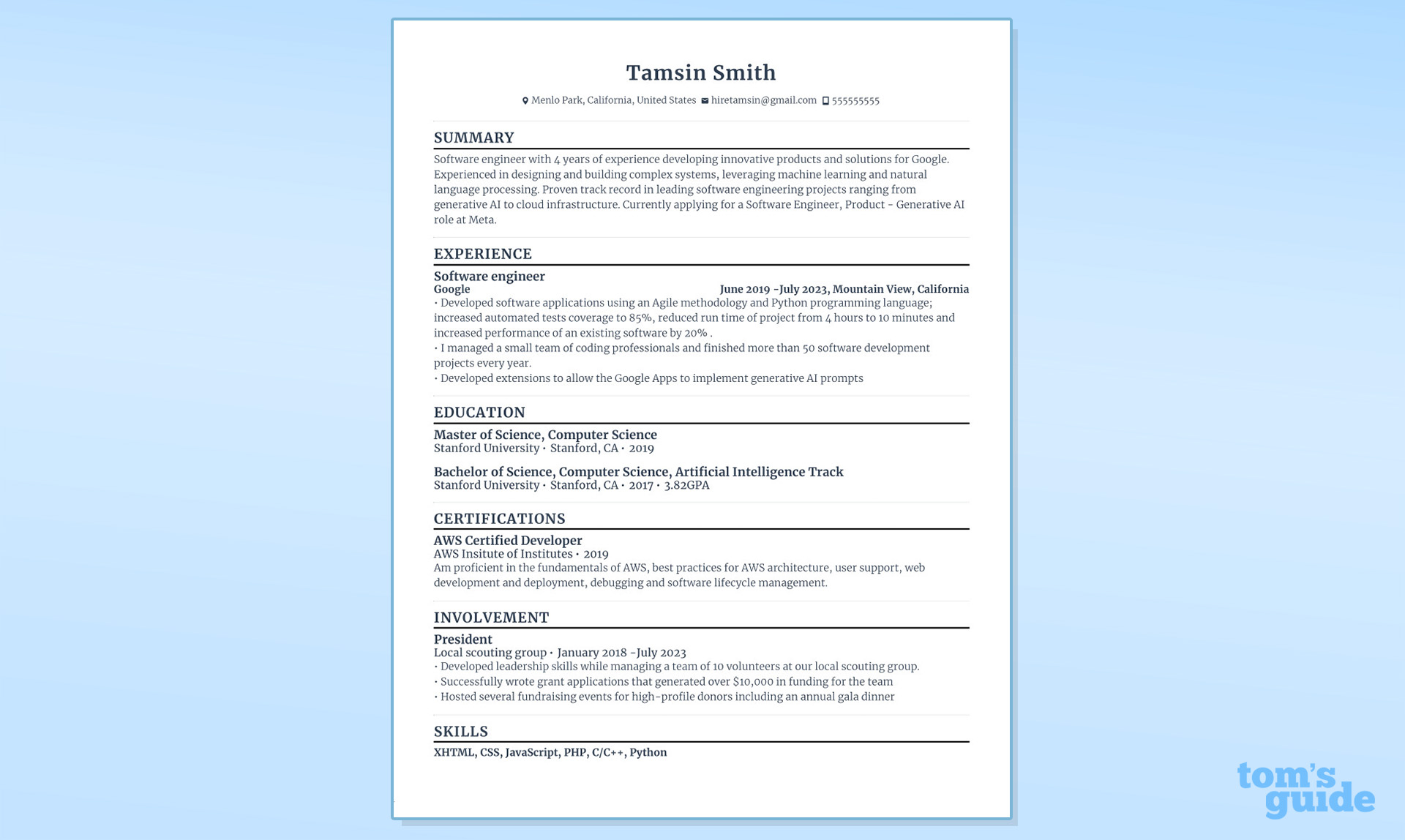
My first attempt was with Rezi.ai since it offers a free basic service and I wanted to check if the way I designed the review could work in principle. And it did!
Right after confirming my email, I was creating Tamsin Smith’s first resume.
I was presented with a choice between a “Job-Tailored Resume” and a “General Purpose Resume”; I went with the first choice as it was exactly what this test was about. It asked me for the role and company I’m targeting but I was blindsided when Rezi asked me to insert a job application I’d written for the role. Isn’t this something the AI should be doing for me?
I finished this side quest and then added basic details like my name and email, followed by my previous work experience. Here’s when I first encountered signs of AI life in the form of a bullet point generator to further explain my role.
Rezi went on to ask me to add details on projects I’d worked on, my education history, certifications, coursework, involvement in other organizations, and my skills.
The next exciting step was the summary section, where I gladly let the AI take control. It was nothing I couldn’t have come up with myself if I simply wanted to summarize my resume, but it at least merits a pass mark. (I wanted to ask the AI to write a cover letter for me based on the finished resume but that feature requires a subscription.)
Overall Rezi marked the resume it produced at 87 out of 100, which I think is a bit too generous. If you have a rough idea of what you want your resume to look like, by all means, use Rezi so you don’t have to worry about the formatting. It might also provide a helpful AI-generated bullet point or two along the way.
If you were worried that not using Rezi’s AI was the one thing stopping you from getting your dream job, rest assured that (at least with its free version) this is not the case.
My score: 3/5
Resumaker.ai
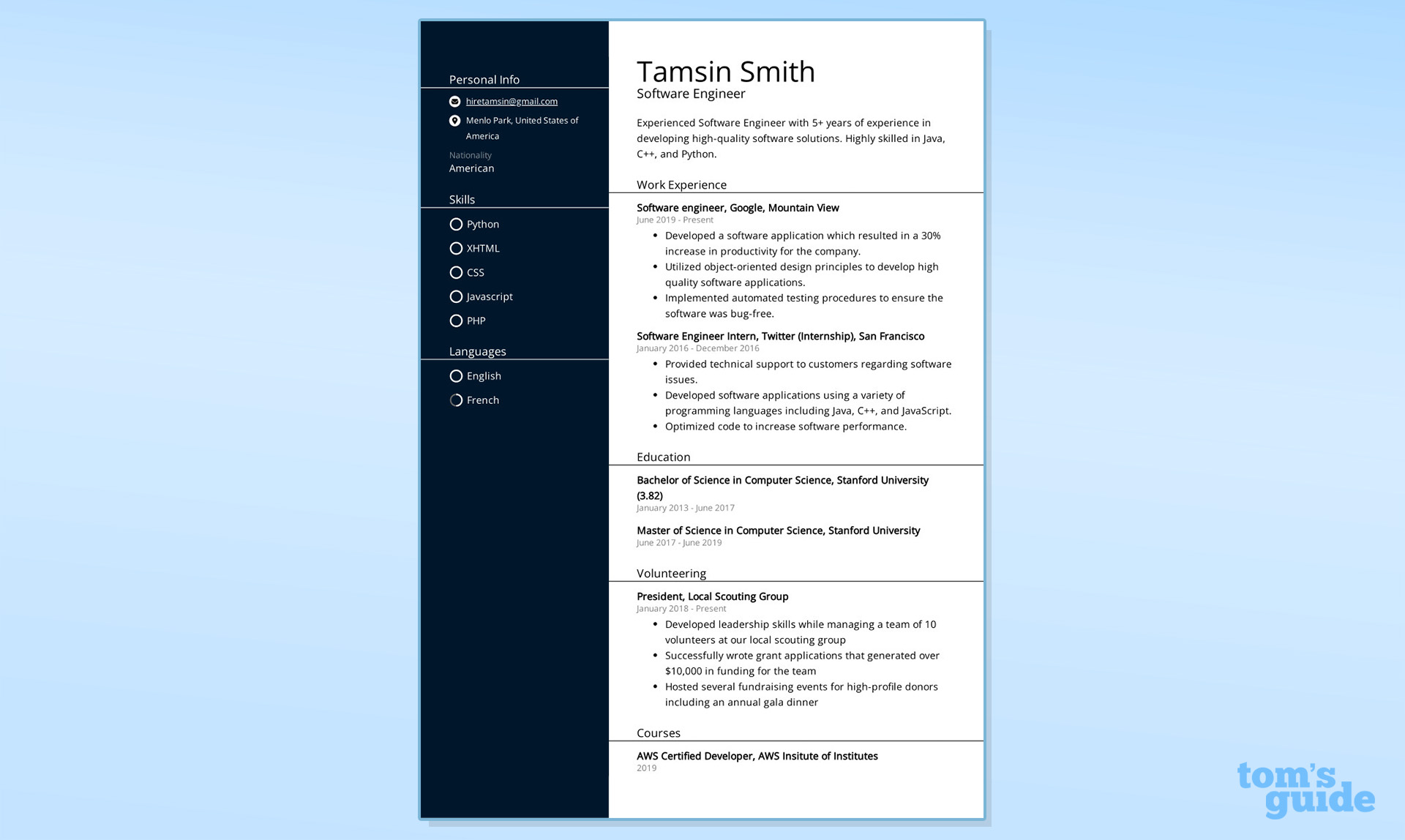
“Designed templates that will get you hired at the world’s leading companies,” Resumaker proudly displayed on its homepage. I also had to pay ($0.99) to download my résumé and cover letter. Surely, I was on the verge of getting Tamsin hired?
By now I’d gotten the hang of inserting details like my education and work history. In this regard, little separates the résumé builders tested here.
The AI kicked in to provide me with text I could insert as accomplishments in my jobs and as the headline summary. The latter left much to be desired but at least it was presentable. Resumaker didn’t offer to beef up my volunteering section so I had to write that part manually. As a whole, the résumé felt a bit dry but at least it was presentable.
However, it’s a good thing this service isn’t called Coverlettermaker. Every sentence it generated started with either an “I am” or “I have”. When you’re working with such a structure, there’s only so much you can do to make the rest more exciting. Furthermore, it left the [Company Name] field for me to fill in. AI that’s supposed to help me land a job in a highly competitive market should come with higher standards.
Resumaker.ai claims that thousands of applications it created landed people jobs. If there’s any truth to that, then on the bright side we really shouldn’t be overthinking what we’re sending to hiring managers.
My score: 3/5
Tealhq.com
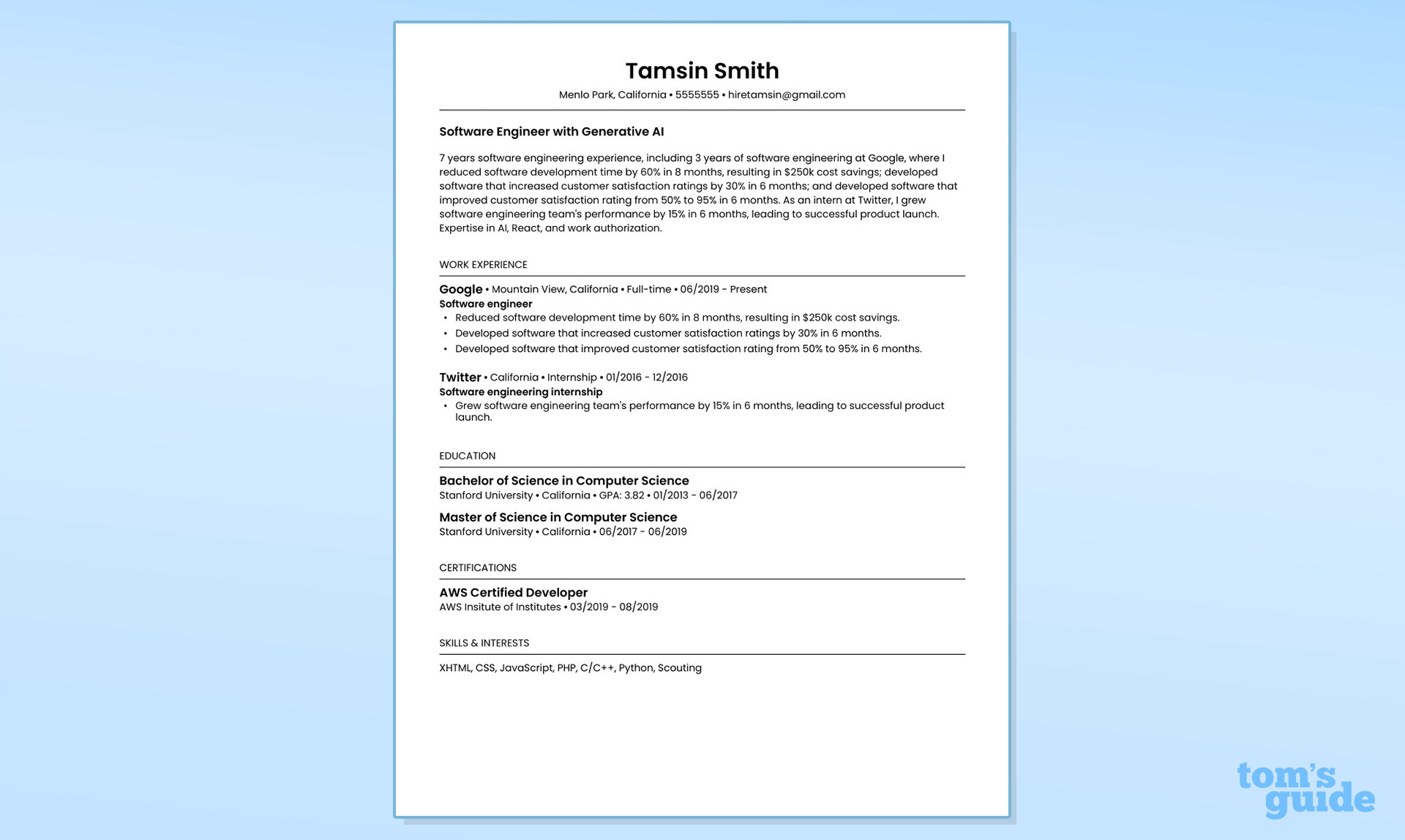
The main question I asked myself before deciding whether each AI builder deserved a pass mark was: Can I send out the résumé as is?
Teal didn’t quite make the cut here.
It asked me to connect the specific job I was applying for from LinkedIn to the résumé and it started analyzing the job ad for keywords I should include. Fantastic! I was ready for a made-to-measure summary, past accomplishments, and cover letter — the areas where I wanted the AI to work its magic.
Unfortunately, this is where I felt let down. In the headline summary, Teal ended up giving me a compilation of the achievements it had previously generated but also prominently added that I had expertise in “work authorization”. The AI thought the right to work in the U.S. requirement from Meta’s job description was a hard skill.
It scored its own resume at 79%.
As far as its cover letter goes, I appreciated that I could generate it for free without having to spend time adding more details than I already had. However, the result wasn’t something that I could have half-heartedly written myself.
My score: 2/5
Kickresume.com
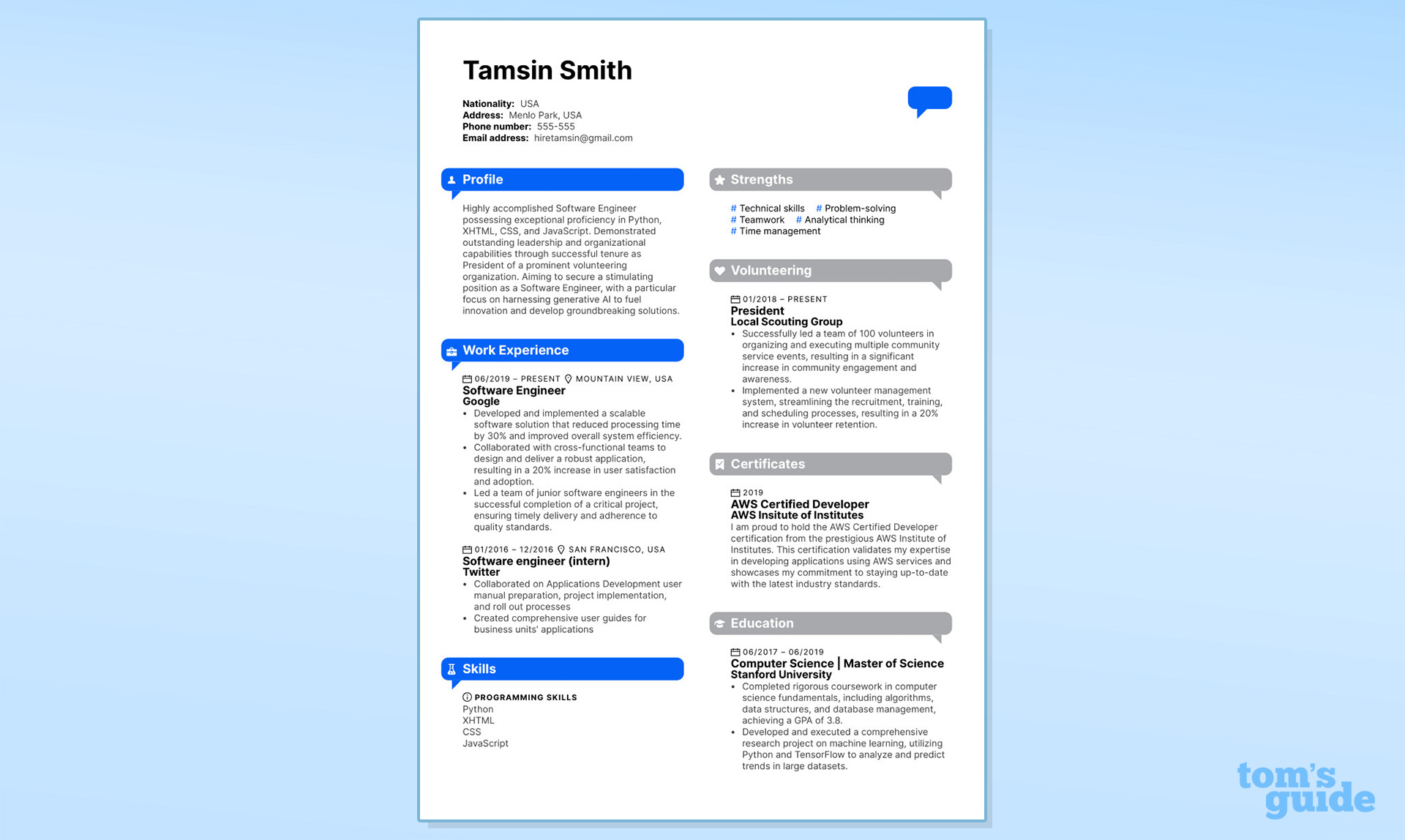
The last AI resume maker I wanted to test was Kickresume, which had the highest monthly fee out of the lot at $19 per month. You can bring that down by paying an annual lump sum that brings the pricing down to $9 a month or, as I did, utilize the free trial version.
Right when I was losing hope in the résumé generators, Kickresume lifted my spirits.
Its helpful AI writer was alongside me from start to finish, offering handy suggestions for work accomplishments, explaining my certifications, and also suggesting skills I should list specifically for a software engineering position. I ended up with a clean-looking CV and I didn’t even have to break a sweat.
Kickresume gave the résumé it generated a score of 88/100.
If I’m in a pinch and need a new résumé that I don’t have to scan for AI-generated sentences that would land me in the ‘rejected’ pile, Kickresume.com is the first website I’ll be visiting.
I wanted to add a nice cherry to the cake, so I asked Kickresume to create a cover letter using the great résumé it made. But this is where I was underwhelmed.
While devoid of grammatical errors, I felt as though the AI didn’t take the résumé and job description I gave into consideration. It provided me with a few short lines that didn’t even name-drop Tamsin’s fictitious stints at Twitter and Google. You wouldn’t even know she completed two degrees at Stanford. Based on my positive experience with the résumé, I couldn’t believe this was the same AI content generator.
My score: 4/5
ChatGPT
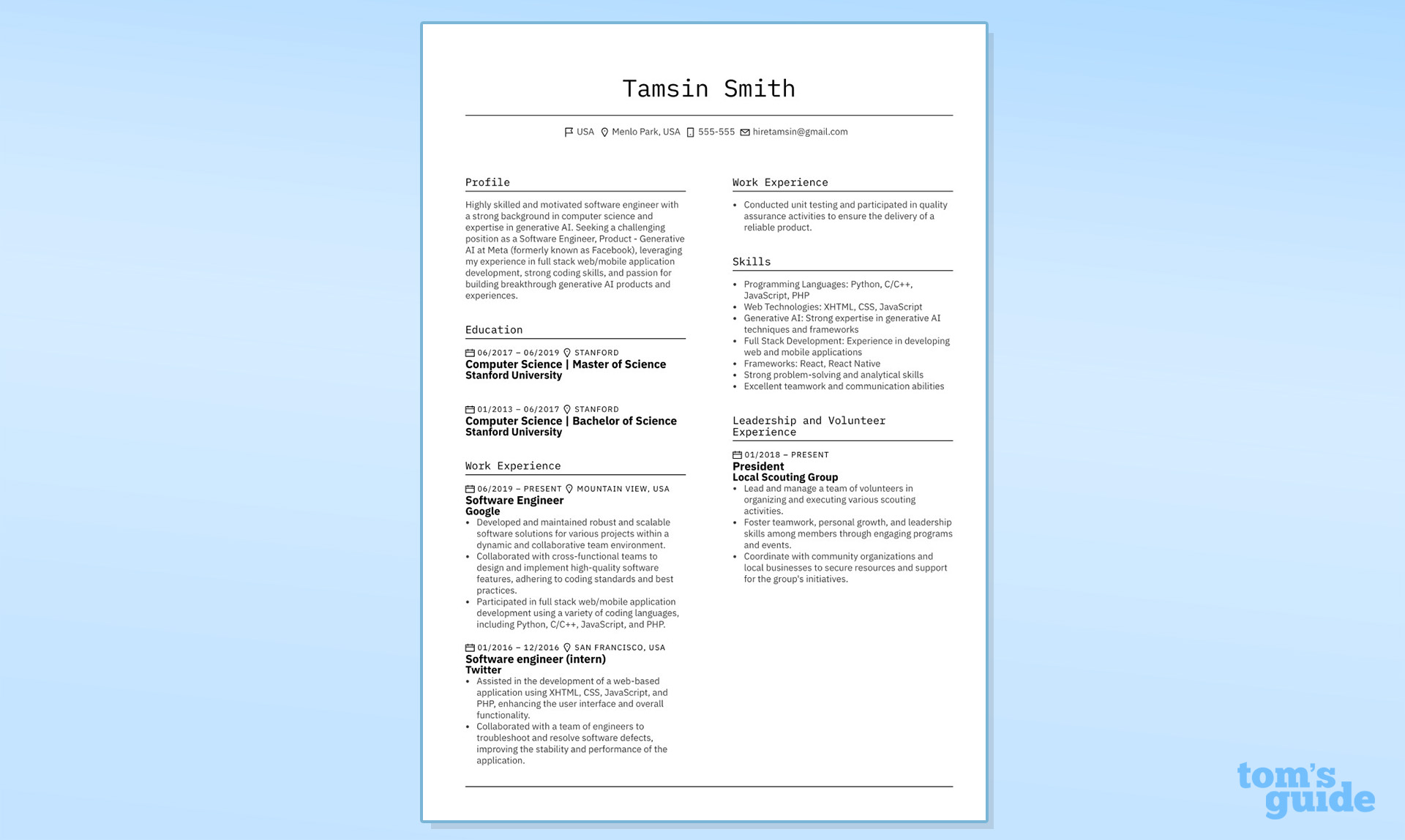
No subscriptions. No plugins. I wanted to see how well the free version of OpenAI’s ChatGPT would do against the four dedicated AI résumé and cover letter generators listed above.
I tweaked a prompt that I found online and, in 161 words, I asked the AI for a first draft of my new résumé. I then asked the chatbot to refine its work based on the job description I gave it to make my résumé less generic. In seconds, I had my second draft.
Since ChatGPT only gave me a plain text version of my résumé, I then pasted what it gave me into a template from one of the previous builders.
I’m happy to announce that both myself and Tamsin were very pleased with the results. The résumé easily rivals the ones generated from the other services I tested. I wouldn’t have minded some text to beef up the education section to explain what I had learned at Stanford. Also, the line pointing out that Meta was previously called Facebook is something I would never have included in a résumé intended for Meta’s eyes. Other than that, ChatGPT gave me decent results in the shortest amount of time.
I was especially impressed with the cover letter I asked ChatGPT to craft for me. It was perhaps a bit too long for some tastes but it was arguably the most well-rounded out of the five.
Honorary score: 4/5
The verdict
There have already been reports of people using AI to write résumés and cover letters who ended up getting hired for the positions they’ve applied for, and I’m not surprised. But as this test has shown, a website’s claim that it uses AI to provide a service is not some kind of guarantee of the level of service you can expect.
Shop around when looking for AI résumé and cover letter writers. Perhaps combine two or more of them to leverage each one’s specific strengths. But add the finishing touches yourself.
More from Tom’s Guide
For all the latest Technology News Click Here
For the latest news and updates, follow us on Google News.
